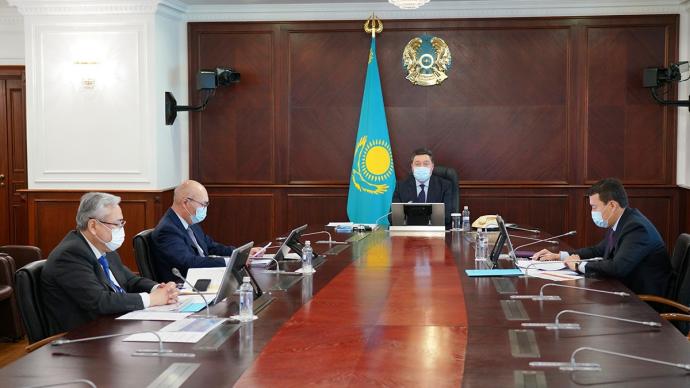Kazakhstan intends to introduce investment ratings of regions
The meeting of the Investment Headquarters, chaired by Prime Minister Askar Mamin, considered the progress achieved in implementing new approaches to attracting investments, which had been presented at the meeting of the Supreme Council for Reforms under the President of the Republic of Kazakhstan.

The Minister of National Economy Aset Irgaliyev reported that it is planned to introduce the Investment Rating of the Regions in order to comprehensively assess the efficiency of existing measures to attract investment. It enables to identify the best practices for working with investors and stimulate the work of local authorities. The rating consists of 50 indicators based on information collected by the survey method, as well as statistical data and expert evaluation.
The investment rating of the regions and the National Investment Report are expected to be released in the 1st quarter of each year. The structure of the National Report will be coordinated within two weeks with experts from the World Bank, the European Bank for Reconstruction and Development and the Asian Development Bank. Taking into account the recommendations received, the Institute for Economic Research in conjunction with NC Kazakh Invest JSC will prepare the first issue of the Rating and the Report for 2020.
Deputy Prime Minister - Minister of Foreign Affairs Mukhtar Tleuberdi, Chair of the Agency for Strategic Planning and Reforms - CEO of the Astana International Financial Center (AIFC) Kairat Kelimbetov and Chairman of the Board of NC Kazakh Invest JSC Meirzhan Yusupov reported on the work of the special Task Force team comprising of experts of the AIFC Business Connect and NC Kazakh Invest JSC. The Ministry of Trade and Integration offered to include in this team the representatives of Qaztrade Trade Policy Development Center JSC.
The Task Force will act as a single negotiator on behalf of the Government with foreign investors, formulate draft strategic investment agreements, involve central state and local executive agencies, quasi-state entities in investment projects, and accompany investors following the decision of the Investment Headquarters before the start of operating activities.
Minister of Industry and Infrastructure Development Beibut Atamkulov stressed that in 2021-2025, it is planned to implement 819 projects in the industry, construction industry, transport sector, subsoil use and the military-industrial complex amounting to KZT17.6 trillion of private investment. This year, the target volume of investments in the fixed assets is set at KZT6 trillion.
Alik Aidarbayev, Chair of the Management Board of NC KazMunayGas JSC, reported that the company's investment portfolio contains 57 projects accounting for KZT58.1 trillion. The issues are under consideration to implement investment projects of subsoil use on the Caspian shelf such as Abai, Isatay, Zhenis, Al-Farabi, Kalamkas-Sea, Khazar and Khvalynskoye. This year, it is planned to complete investment projects of the reverse as part of construction of the Kazakhstan-China oil pipeline, construction and modification of a jack-up floating drilling rig at the Absheron and Babek fields in the Azerbaijani sector of the Caspian Sea, gasification of Almaty city, development of a retail network in the Black Sea region, construction of a compressed air production unit for the KPI needs, etc.
Akim of Nur-Sultan city Altai Kulginov highlighted that for the next 5 years, a pool of 125 projects has been formed totaling KZT2 trillion of investments creating 18,000 new jobs in industry, trade and logistics, construction industry, electricity, education, medicine and sports. Since the beginning of this year, the investment growth is observed by 16.4%. In total, this year it is planned to attract KZT1.26 trillion of investments in the fixed assets of the capital.
Deputy Akim of Almaty region Serik Turdaliyev reported that during the next five years it is planned to implement 150 projects in the region worth over KZT 1.7 trillion in the industries such as mechanical engineering, production of building materials, agriculture, fish farming, food production, mining and metallurgy, logistics, renewable energy, etc. This year it is planned to attract KZT453 billion of investments to the region.
“Systematic work to attract domestic and foreign investments needs to be done in order to restore business activity and further qualitative growth of the economy,” A. Mamin said.
